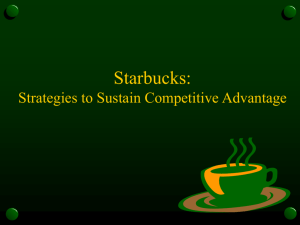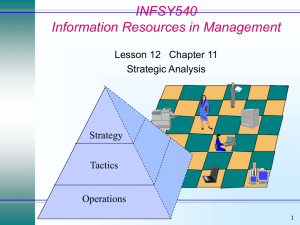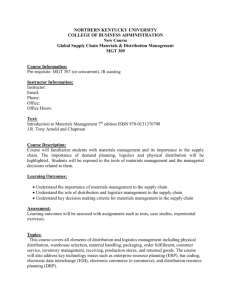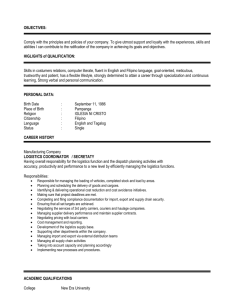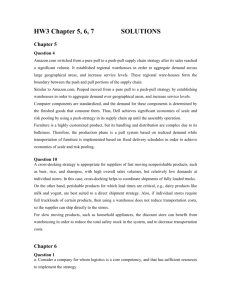Welcome to Architect Insight 2009
advertisement
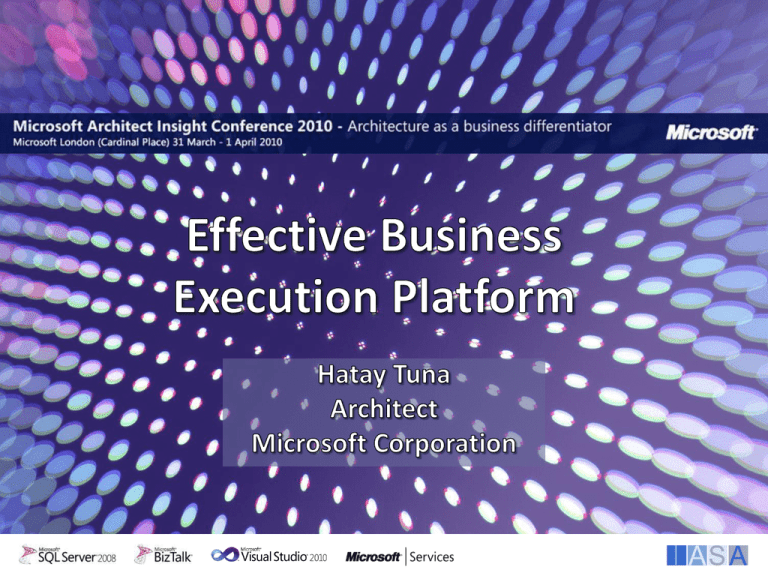
Interoperability Industry Enterprise Competitive Strategy Application Requirements Component Specifications Today’s Agenda • Competitive Strategy – What is Competitive Advantage? – What is Value? – What are the Generic Competitive Strategies? • Sources of Competitive Advantage – Where to look for opportunities for Competitive Advantage? Industry Enterprise Competitive Strategy Application Requirements Component • Business Execution Platform – How to build a platform to transform Competitive Strategies into Architecture? Specifications Organisation's plan to differentiate it from its rivals. COMPETITIVE STRATEGY Strategy War Government Business Chess Personal Life Sports Competition And so on... Strategy is a plan that aims to give the enterprise a competitive advantage over rivals. Competitive Strategy At the heart of the Failure or Success of organisations Is the search for a favourable competitive position in an industry, the fundamental arena in which competition occurs. Competitive strategy aims to establish a profitable and sustainable position against the forces that determine industry competition. Competitive Strategy is driven by Industry Attractiveness (shaped by 5 forces) Relative Competitive Position in the industry Value The amount of buyers that we are willing to pay for what a companies products and/or services. Measured by total revenue. Profitable if the value exceeds the costs involved creating and/or delivering the product/service. Competitive Strategy Generic Competitive Strategies to achieve Competitive Advantage – Cost Leadership – Differentiation – Focus (Cost Focus, Differentiation Focus) Creating Value for buyers the exceeds the cost of doing so is the principal aim of any generic strategy. Implementation of any strategy is as, if not more, important as the strategy itself! Identifying Opportunities for Value Creation SOURCES OF COMPETITIVE ADVANTAGE IN BUSINESS ARCHITECTURE Opportunities for Value Creation We need a holistic, abstract view of the business We need an approach to analyse business by its functions – What it does, then how it does it... We need to understand the decomposition of the organisation and what it does to spot opportunities for Competitive Advantage Relative Change Durability Abstraction Organisational Structures... Process Models... Infrastructure Diagrams... Evolution of the Enterprise shaped by Competitive Strategy Time B. Customer-facing Channel Partners A. Customer 1. Develop Products/ Services C. Suppliers 2. Generate Demand 5. Collaborate 3. Deliver Products/ Services E. Financial Providers D. Logistics Providers 4. Plan and Manage the Enterprise F. Infrastructure and Compliance Design Product/Service Sales Provide Service Property and Advisory Planning Collaboration Refine Existing Product/Service Marketing Procurement Project Management Strategic Collaboration Develop New Product/Service Channel Management Produce Product Financial Management Operational Collaboration Product/Service Management Customers Business Intelligence Human Resources Logistics Advanced Planning Design Product/Service Sales Provide Service Property and Advisory Planning Collaboration Refine Existing Product/Service Marketing Procurement Project Management Strategic Collaboration Develop New Product/Service Channel Management Produce Product Financial Management Operational Collaboration Product/Service Management Customers Business Intelligence Human Resources Logistics Advanced Planning Order Order Fulfilment Management Transportation Sales Management Inventory Point of Sales Management Business Architecture decomposes organisation’s operational model into abstract business functions called capabilities; – Capabilities are Abstract, Stable and have Clear Boundaries Warehouse Product Pricing Management Prospect Qualification Your customers (buyers) and suppliers have capabilities also. Business Architectures are linked through connections between capabilities across organisations. B. Customer-facing Channel Partners A. Customer B. Customer-facing Channel Partners A. Customer And your rivals has theirs too! “How others are doing it?” B. Customer-facing Channel Partners A. Customer 1. Develop Products/ Services C. Suppliers E. Financial Providers C. Suppliers 2. Generate Demand 5. Collaborate 3. Deliver Products/ Services E. Financial Providers 1. Develop Products/ Services D. Logistics Providers C. Suppliers 4. Plan and Manage the Enterprise B. Customer-facing Channel Partners A. Customer D. Logistics Providers 1. Develop Products/ Services 4. Plan and Manage the Enterprise F. Infrastructure and Compliance C. Suppliers 1. Develop Products/ Services C. Suppliers 5. Collaborate D. Logistics Providers B. Customer-facing Channel Partners A. Customer 5. Collaborate 3. Deliver Products/ Services E. Financial Providers 3. Deliver Products/ Services 2. Generate Demand D. Logistics Providers 4. Plan and Manage the Enterprise F. Infrastructure and Compliance E. Financial Providers E. Financial Providers 2. Generate Demand 4. Plan and Manage the Enterprise F. Infrastructure and Compliance 2. Generate Demand 5. Collaborate 3. Deliver Products/ Services F. Infrastructure and Compliance 2. Generate Demand 5. Collaborate 3. Deliver Products/ Services 1. Develop Products/ Services D. Logistics Providers 4. Plan and Manage the Enterprise F. Infrastructure and Compliance Most companies in the same industry do the same things (WHAT); the differentiation is in HOW they do things. Competitive Strategy shapes the Evolution of the Enterprise to achieve and sustain Competitive Advantage. – It also alters WHAT through (i.e. Acquisition and/or Organic Growth) Law Retail Manufacturing Banking Utility Health Cost Advantage A company has a cost advantage if its cumulative cost of performing all value capabilities is lower than competitors’ costs. Capability Model provides the basic tool for cost analysis Design Product/Service Sales Provide Service Property and Advisory Planning Collaboration Refine Existing Product/Service Marketing Procurement Project Management Strategic Collaboration Develop New Product/Service Channel Management Produce Product Financial Management Operational Collaboration Product/Service Management Customers Business Intelligence Human Resources Logistics Advanced Planning Differentiation A company differentiates itself from its competitors if it can be unique at something that is valuable to buyers. Not all uniqueness leads to differentiation Differentiation has a cost associated with it too!! Differentiation is not always about the product but opportunities for uniqueness and better performance can be found in Business Architecture Design Product/Service Sales Provide Service Property and Advisory Planning Collaboration Refine Existing Product/Service Marketing Procurement Project Management Strategic Collaboration Develop New Product/Service Channel Management Produce Product Financial Management Operational Collaboration Product/Service Management Customers Business Intelligence Human Resources Logistics Advanced Planning Technology as Competitive Advantage Technology can alter industry structure and level the playing field. Technology can be Competitive Advantage if it enhances Cost Advantage or Differentiation Think technology in Products/Services Capabilities and connection between spanning customers and suppliers... Innovation is the fundamental approach to Technology Strategy Architecture as needs to marry right technologies to Competitive Strategy to achieve or sustain Competitive Advantage Think about S+S, Cloud... How can you leverage these as Competitive Advantage? Which technologies do your rivals invest and use? Foundation for Delivering Strategic Initiatives EFFECTIVE BUSINESS EXECUTION PLATFORM Competitive Strategy Technology/IT Strategy Limits and Opportunities for Competitive Advantage IT Governance Enterprise Architecture Architecture Strategy Architecting Process Represents TO BE IT Architecture Reference Architecture Sources for Competitive Advantage Change driven through Strategic Initiatives Business Architecture Capabilities Architecture Governance People Process IT IT Architecture Transformation Architecture Delivery Data Infrastructure Hardware, Network, Storage Security Delivery Model Operations Application Understand your organisation's Competitive Strategy – Technology/IT Strategy must be part of the Competitive Strategy Competitive Strategy Technology/IT Strategy IT Governance Enterprise Architecture Architecture Strategy Architecting Process Reference Architecture Competitive Strategy B. Customer-facing Channel Partners A. Customer IS/IT Strategy 1. Develop Products/ Services Limits and Opportunities for Competitive Advantage C. Suppliers 2. Generate Demand D. Logistics Providers 5. Collaborate 3. Deliver Products/ Services 4. Plan and Manage the Enterprise F. Infrastructure and Compliance E. Financial Providers Enterprise Architecture Architecture Strategy Architecting Process Reference Architecture Design Product/Service Sales Provide Service Property and Advisory Planning Collaboration Refine Existing Product/Service Marketing Procurement Project Management Strategic Collaboration Develop New Product/Service Channel Management Produce Product Financial Management Operational Collaboration Customers Business Intelligence Human Resources Product/Service Management Logistics Advanced Planning Identify Opportunities for Competitive Advantage in your Business Architecture; – Cost Advantage – Differentiations Technology can be a Competitive Advantage Inform Competitive Strategy about the Limits and Opportunities Sources for Competitive Advantage Business Architecture Capabilities People Process IT Develop an Architecture Strategy to reflect organisation’s IS/IT Strategy – Strategy sets the context – Reference Architecture helps you keep an eye on the goal – Architecting Process helps you get there – Architecture Delivery makes it real Competitive Strategy IS/IT Strategy Enterprise Architecture Architecture Strategy Architecting Process Reference Architecture Represents TO BE IT Architecture Change driven through Strategic Initiatives Architecture Governance IT Architecture Architecture Delivery Data Infrastructure Hardware, Network, Storage Security Delivery Model Operations Application Architecture as a Business Differentiator? SUMMARY Competitive Strategy Technology/IT Strategy Understanding of Competitive Strategy is key - Cost Leadership, Differentiation and Focus Enterprise Architecture Architecture Strategy Architecting Process Sources for Competitive Advantage Change driven through Strategic Initiatives Business Architecture Capabilities Architecture Governance People Process IT IT Architecture Operations Application Delivery Model Transformation Data Infrastructure Architecture Delivery Hardware, Network, Storage Focus on Business Architecture - Limits and Opportunities for Competitive Advantage - Competitive Strategy shapes How you do things... - People, Process and Technology - Capability Model (What you do) - Technology Build and action on the platform - Project by project, initiative by initiative... Represents TO BE IT Architecture Reference Architecture B. Customer-facing Channel Partners A. Customer 1. Develop Products/ Services C. Suppliers 2. Generate Demand D. Logistics Providers 5. Collaborate 3. Deliver Products/ Services 4. Plan and Manage the Enterprise F. Infrastructure and Compliance E. Financial Providers Design Product/Service Sales Provide Service Property and Advisory Planning Collaboration Refine Existing Product/Service Marketing Procurement Project Management Strategic Collaboration Develop New Product/Service Channel Management Produce Product Financial Management Operational Collaboration Product/Service Management Customers Business Intelligence Human Resources Logistics Advanced Planning Security Focus on Enterprise Architecture - Architecture Strategy (Plan to get to...) - Reference Architecture (Where to get to...) - Architecture Process (How to get to...) - Architecture Delivery (Execution of the Plan) Limits and Opportunities for Competitive Advantage IT Governance Q&A Thank you... Please email me @ hatay.tuna@microsoft.com for more... And enjoy the Drinks Reception and rest of the event!
